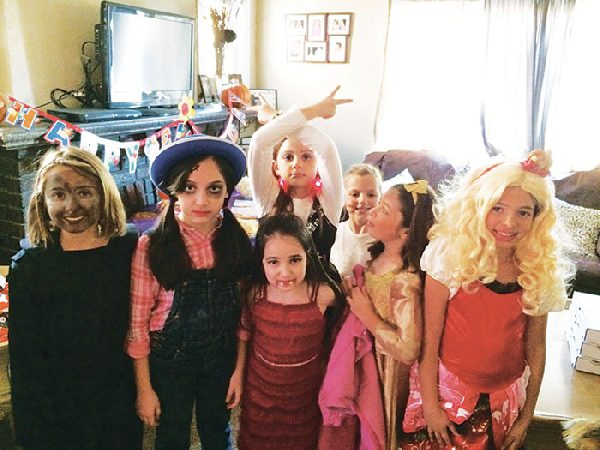
DEARBORN — Whether it be trick-or-treating, carving a pumpkin for the front porch or spending big bucks for thrills at a haunted house, Halloween has transitioned into a month-long lifestyle in the U.S.
In recent years, both adults and children have been increasingly indulging themselves with lavish decorations, tasty treats and creative costumes, turning Halloween into one of the biggest consumer holidays of the year.
The trend appears to be no different for the local Arab American and Muslim community. Now, more than ever, local parents and children seem to be full-blown participants in these festivities themselves.
It’s also evident that the celebration of Halloween seems to have sparked a cultural clash in the local community, as Muslims have argued for years that the holiday conflicts with the ideologies of Islam.
The clash became even more apparent this year, as Halloween falls right in the middle of Ashura, a 10-day memorial period practiced by Shi’a Muslims.
Muslim leaders widely condemn any celebration or festivities during the 10-day period in order to mourn the death of Husain ibn Ali, the grandson of Prophet Mohammad. Muslims are likely to wear black attire and refrain from listening to music during this period.
Halloween, on the other hand, is a yearly celebration with roots dating back to the ancient Celtic holiday of Samhain on Oct. 31, the last day of the year of the Celtic calendar. As Christianity spread, church leaders designated Nov. 1 as All Saints Day , with Oct. 31 as “All Hallows Eve”, later shortened to “Halloween.” Halloween was a day to remember the dead, which included saints and martyrs. During the dark ages, some Christian Churchs in Europe believed it was the night the devil came out to walk the streets.
As Halloween made its way to the U.S., it began to evolve into a commercialized holiday, with an emphasis on children and teenagers.
This year, the Islamic House of Wisdom, located in Dearborn Heights, is encouraging parents to bring their children to a special Ashura program on Halloween instead of taking them trick-or-treating. The program will include a dinner, a family interactive session and guest speakers.
“This Ashura, instead of knocking at the neighborhood houses, kids can come and knock at the gate of God’s house and eat and get energized spiritually and enjoy the fun of talking with faithful friends,” Imam Mohammad Ali Elahi told The Arab American News.

While Muslim traditions have fallen in the middle of nationally celebrated holidays before, Halloween crossing paths with Ashura can present a dilemma for many Muslim Americans.
Local parent Nofila Haidar said her 7-year-old daughter was upset this week after her instructors at an Islamic Saturday school had told her it wouldn’t be appropriate to celebrate Halloween this year because of Ashura.
“They are having a Halloween party at her school and she was really sad and confused because she thought she couldn’t participate,” Haidar said. “I told her we can do both. It’s not a matter of choosing between culture and religion. Celebrating Halloween or other holidays that aren’t Islamic is not a big deal to me. I will set the boundaries at home as far as what my children should believe.”
As the vice president of the PTA at Becker Elementary School in east Dearborn, where both of her daughters attend, Haidar said conflicts occasionally arise between parents and faculty when celebrating the holidays.
With a student body of predominantly Arab and Muslim Americans, the elementary school has now become prone to celebrating holidays all year long, whether it be Halloween, Thanksgiving, Christmas or the Eid.
“Last year, the complaint was why are we having a Halloween party and not an Eid party. So now we have Eid parties too,” Haidar said. “We celebrate Mother’s Day, Father’s Day, St Patrick’s Day…we’ve included all holidays throughout the year so that nobody feels secluded.”
Haidar said that while some of her fellow Muslim parents stray away from allowing their children to participate in holiday festivities, she sees it as an opportunity for her children to learn about their cultural surroundings.

“It’s a matter of diversity, not seclusion,” Haider said. “I refuse to let them my kids believe that we can only engage in Islamic activities. If we want our own culture and beliefs to be accepted by western society, then we need to take a step forward and meet them in the middle. I’m completely against secluding my kids. I want them to be accepting of other people’s cultures and believes.”
Another local resident, Amal Hammoud Berry, said she understands if adults refrain from engaging in Halloween festivities during Ashura, but she doesn’t expect parents to ban their children from trick-or-treating.
“These are younger children going around trick or treating and to try to put them in a mosque and explain the tragedy in Karballah— they might not fully comprehend it, so why expose it to them right now?” Berry asked. “Let them be kids. Let them have their childhood.”
Berry pointed out that her 13-year-old son decided that he was too old to trick-or-treat this year. Instead, he will stay at home to pass out candy. Her son feels its his way of giving back to the neighborhood for all the years that he went door-to-door knocking for treats.
Berry noted that often times community members will attempt to label westernized traditions as “haram” or unwarranted from a Muslim perspective, which could come off as contradictory.
“There’s no reason to demean it or make it haram,” Berry said. “Everything can’t be haram when you live in a country based on Judaic Christian beliefs— you can’t come in and impose your beliefs too. What’s the point in living here if you can’t blend in? Don’t take Halloween away from the kids. They only have a small window of childhood and then they will see the real world when they get older.”






Leave a Reply